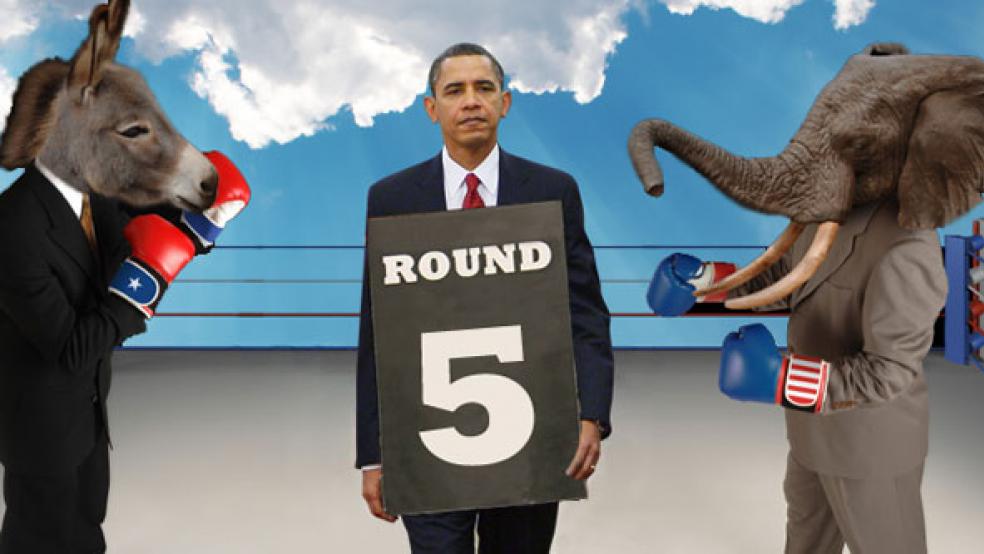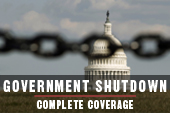The state of the government shutdown (and possible default) is in limbo, as pessimism began to give way on Friday to that rare combination of hope and uncertainty.
After weeks of a tense showdown, President Obama has enjoyed helpful but less than definitive conversations with GOP senators and congressmen over the past two days. It’s a breath of fresh air for an administration that has refused to negotiate and Republicans who had yet to demonstrate much capacity for doing so.
Over the past day, House Republicans have floated two plans to temporarily end the showdown so that actual negotiations could begin.
RELATED: RELIEF FROM DEBT CEILING DISASTER DOESN'T MEAN A DEAL
Their latest plan would reportedly extend the debt limit through Nov. 20, averting the default that could strike shortly after Oct. 17 without a deal in place. GOP lawmakers would also reopen the government with a bill that would trim entitlement spending, but also reduce the size of the sequestration budget cuts.
Obama spoke by phone on Friday with House Speaker John Boehner (R-OH). “The two of them agreed that all sides need to keep talking,” said White House press secretary Jay Carney.
The situation was summed up on Friday afternoon by several GOP senators after their White House meeting as a relatively positive experience.
Sen. Susan Collins (R-ME) called it “a good exchange, but it was an inconclusive exchange.” She added that Obama “may not want to call it a negotiation, [but] that’s what I would call it.”
Sen. Chuck Grassley (R-IA) tweeted that it was a “Very good discussion on shutdown,” adding that nothing had been decided but “there may be progress.”
Sen. Bob Corker (R-TN) told The Washington Post that it was a “serious policy content conversation … it’s very possible that over the next short amount of time a constructive agreement may occur.”
Not everyone was optimistic, most notably, Sen. John Cornyn (R-TX), but the mood largely seemed positive as expectations now exist that the standoff could be resolved by next week.
RELATED: G-20 URGES U.S. TO ACT QUICKLY TO AVOID DEFAULT
Americans have seen a similar pattern in past negotiations over the debt ceiling in 2011 and fiscal cliff last year. The scenario tends to follow this pattern: stalemate; frustration; looming disaster surfaces; blame game begins; polite meetings start; unexplained optimism follows; inevitable setback happens; frustration returns; last minute agreement, and suddenly a deal is in place until the next crisis.
With that in mind, there are three critical factors to watch for next to see whether the inevitable setback is next:
* What Does Senate Majority Leader Harry Reid Say? – Pay attention to how the Nevada Democrat reacts to what gets proposed, once the House Republican plan appears in paper form as opposed to anonymous quotes given to journalists.
Reid was not in the room when Obama met with GOP lawmakers, but he drove the strategy on not negotiating over the debt ceiling and shutdown—insisting that “clean” bills be passed.
* Does the Tea Party Block a Deal? – It’s critical to see how Tea Partiers in Congress respond to the terms of a possible deal, after they forced Boehner into the shutdown by initially demanding that Obamacare be defunded.
Boehner has thus far has refused to allow any floor votes that divide his caucus, so it would be a notable break in strategy if Republicans need Democratic support. As Obama and others have noted, the Tea Party types in the House have little incentive to cooperate with Democrats because of their gerrymandered congressional districts.
Before meeting with Obama on Friday, Sen. Ted Cruz (R-TX) said in a speech at the Value Voters Summit that he would keep the battle going … on every single issue.
“None of us know what’s going to happen on this Obamacare fight right now,” Cruz said. “In my view, the House of Representatives needs to keep doing what it’s been doing, which is standing strong. And that is the model for every other fight. We need no more Washington solutions.”
* What Does Everyone Say on the Sunday Shows? – By Sunday, there should be more clarity about what a deal would look like and its odds of passage. Fox News Sunday will feature two of the key senators for cutting a deal: Corker, the Tennessee Republican, and West Virginia Democrat Joe Manchin.





